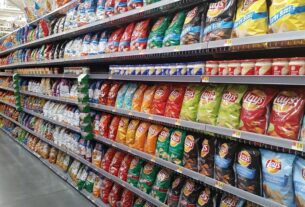The Biggest Grocery Retail Companies in the UK: Who’s Leading the Market?
In the UK, the grocery retail industry is highly competitive, with several major players vying for market share. In this report, we will take a closer look at some of the biggest grocery retail companies in the UK and analyze their performance, market share, financials, volumes, and future plans.
Tesco
Tesco is the largest grocery retail company in the UK, with a market share of around 27%. The company has a strong presence across the country, with over 3,400 stores and a significant online presence. Tesco offers a wide range of products, including fresh produce, groceries, clothing, and electronics.
In terms of financials, Tesco reported revenues of £57.9 billion in the last fiscal year, with a net profit of £1.3 billion. The company has been focusing on expanding its online business and improving its supply chain to meet the growing demand for online grocery shopping.
Tesco’s future plans include further expansion of its online business, investing in technology to enhance the customer experience, and reducing its carbon footprint through sustainable practices.
Sainsbury’s
Sainsbury’s is another major player in the UK grocery retail market, with a market share of around 15%. The company operates over 1,400 stores across the country and offers a wide range of products, including groceries, clothing, and home goods.
In terms of financials, Sainsbury’s reported revenues of £32.4 billion in the last fiscal year, with a net profit of £635 million. The company has been focusing on improving its online business and expanding its product range to attract more customers.
Sainsbury’s future plans include investing in technology to enhance the customer experience, expanding its online business, and introducing more sustainable products to meet the growing demand for eco-friendly options.
Asda
Asda is another major player in the UK grocery retail market, with a market share of around 14%. The company operates over 600 stores across the country and offers a wide range of products, including groceries, clothing, and electronics.
In terms of financials, Asda reported revenues of £22.9 billion in the last fiscal year, with a net profit of £519 million. The company has been focusing on improving its supply chain and reducing costs to remain competitive in the market.
Asda’s future plans include expanding its online business, introducing more private label products, and investing in technology to enhance the customer experience.
Morrisons
Morrisons is another major player in the UK grocery retail market, with a market share of around 10%. The company operates over 500 stores across the country and offers a wide range of products, including groceries, clothing, and home goods.
In terms of financials, Morrisons reported revenues of £17.7 billion in the last fiscal year, with a net profit of £321 million. The company has been focusing on improving its supply chain and expanding its online business to meet the changing needs of customers.
Morrisons’ future plans include investing in technology to enhance the customer experience, expanding its product range to attract more customers, and introducing more sustainable practices to reduce its environmental impact.
Aldi
Aldi is a German discount supermarket chain that has been rapidly expanding its presence in the UK grocery retail market. The company has a market share of around 8% and operates over 800 stores across the country.
In terms of financials, Aldi reported revenues of £12.3 billion in the last fiscal year, with a net profit of £369 million. The company has been focusing on offering high-quality products at low prices to attract price-conscious customers.
Aldi’s future plans include further expansion of its store network, investing in technology to enhance the customer experience, and introducing more organic and sustainable products to meet the growing demand for eco-friendly options.
Lidl
Lidl is another German discount supermarket chain that has been making significant strides in the UK grocery retail market. The company has a market share of around 7% and operates over 700 stores across the country.
In terms of financials, Lidl reported revenues of £10.8 billion in the last fiscal year, with a net profit of £274 million. The company has been focusing on offering a wide range of high-quality products at competitive prices to attract budget-conscious customers.
Lidl’s future plans include further expansion of its store network, investing in technology to enhance the customer experience, and introducing more sustainable practices to reduce its environmental impact.
Conclusion
In conclusion, the UK grocery retail market is highly competitive, with several major players vying for market share. Tesco leads the market with a 27% share, followed by Sainsbury’s, Asda, Morrisons, Aldi, and Lidl.
Each of these companies has its strengths and weaknesses, and they are all focused on expanding their online businesses, investing in technology, and introducing more sustainable practices to meet the changing needs of customers.
Overall, the future of the UK grocery retail market looks promising, with continued growth expected in the coming years as companies adapt to evolving consumer preferences and shopping habits.
For more information on the global grocery retail industry, trends, challenges, and opportunities, visit CulinaryCoverage.com.


